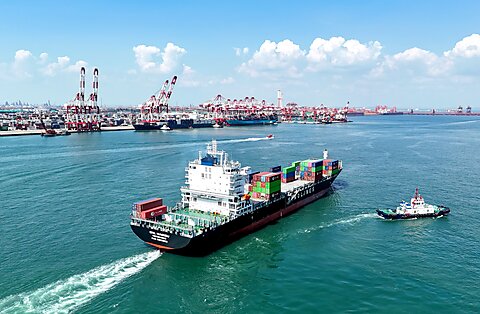Mostly overlooked amidst the myriad tariff announcements of recent weeks was the US Trade Representative’s (USTR) mid-April publication of new fees and requirements for ships transporting US imports and exports. Nominally aimed at China over its alleged harm to the US maritime industry, the measures amount to a costly and heavy-handed interventionism more redolent of Beijing’s economic practices than the free market the United States has traditionally defended.
Unless the Trump administration reverses course, the measures will impose fresh costs and uncertainty on a US economy that can ill afford either.
Last year, several unions petitioned the USTR to take action over China’s alleged unfair practices in shipbuilding and related maritime industries. In a deeply flawed report issued only days before its January 20 departure, the union-friendly Biden administration essentially found China guilty on all counts, setting the stage for punitive action.
That process culminated on April 17, when the new Trump-run USTR unveiled a set of measures billed as a response to China’s misdeeds. In trying to harm Beijing, however, the actions would also inflict considerable damage on the US economy.
New Shipping Fees
The centerpiece of the USTR action is fees on vessels serving US ports that are either Chinese-owned, Chinese-operated, or Chinese-built. Slated to begin in October, the fees would steadily increase until reaching their peak in 2028. Even with carveouts for some vessels—including those below a certain size, vessels arriving empty, and those arriving from foreign ports less than 2,000 nautical miles away—that’s still a considerable number of ships.
Chinese-owned (including Hong Kong) vessels account for over 19 percent of the world’s cargo capacity, and last year, Chinese-built ships accounted for approximately 30 percent of all visits to US ports (including 17 percent of all containership visits).
Many of these vessels will face millions of dollars in fees. According to the Drewry maritime research firm, fees on Chinese-built ships will work out to $180 per forty-foot container when they begin later this year, before rising to $340 in 2028.
Fortunately, workarounds exist. Fees can be avoided by using ships built outside China, vessels with smaller capacities than the threshold at which fees are applied, transhipment via nearby foreign ports, and those owned and operated by non-Chinese companies. But none of that is cost-free. The new fees and efforts to avoid them will mean inefficiencies, reduced competition, and fewer options, exerting upward pressure on shipping prices.
And the higher costs don’t stop there.
Another USTR requirement is that specialized foreign-built ships used for transporting vehicles pay a fee of $150 for every car offloaded starting in October. With nearly all such vessels foreign-built, that’s a new de facto auto tariff on top of the 25 percent tariffs imposed on imported autos in March. For perspective, the top seven vehicle-importing US ports saw over 2.9 million vehicle arrivals in 2022. Multiplied by $150, that’s $435 million in fees from those ports alone.
Costly and Infeasible New LNG Export Requirements
Finally, the USTR action also mandates that, starting in April 2029, a percentage of liquified natural gas (LNG) exports be transported on US-flagged ships constructed in US shipyards. That’s a significant financial burden on US energy firms. US-flagged vessels cost millions more dollars to operate than internationally flagged vessels and at least $500 million more to build, resulting in vastly higher shipping rates. Forcing American exports to be carried on such vessels would place them at a pronounced competitive disadvantage.
It’s utterly antithetical to the White House’s talk of “energy dominance.” Moreover, it’s completely impractical.
No LNG carrier has been constructed in a US shipyard since 1980, and the last six orders of dry cargo oceangoing ships from US shipyards took, on average, over four years from order until delivery. But the USTR believes US-built LNG carriers—a much more complex vessel for which no orders have yet been placed—can be ready to sail by early 2029?
Questionable Logic
The entire USTR action suggests a lack of familiarity with maritime affairs.
It states, for example, that port fees applied to Chinese-built ships and foreign-built vehicle carriers can be suspended if an equivalent vessel is ordered and delivered from US shipyards within three years. That’s an utterly unrealistic amount of time (particularly for vehicle carriers, with the only modern such vessel constructed in the United States requiring over five years to build).
Furthermore, why order a vessel from a US shipyard if port fees can be avoided by using a ship (other than vehicle carriers) constructed outside of China at a fraction of the cost?
Similarly, the proposed fees for vehicle carriers would amount to just over $1 million for a vessel transporting 7,000 cars. That’s significant, but foreign-built vehicle carriers can cost well over $100 million, and US-built ships are typically at least three times the foreign price. Do the math. Exactly how many companies will be lining up to order these US-built ships?
Moreover, why are all foreign-built vehicle carriers — including those constructed in allied countries such as Japan and South Korea—targeted for fees if the USTR action is supposed to be about addressing China?
The LNG tanker requirement raises similar questions. How do China’s alleged nefarious actions justify requiring that some exports be transported by US-built LNG tankers, a vessel type of which only seven percent have been built in China? And how many companies will order such an expensive vessel to fulfill a requirement that a future administration might remove?
Industrial Policy by Decree
The USTR’s actions seem as much aimed at implementing robust industrial policy as at punishing China. The Trump administration is essentially seeking to reshape parts of the US economy via executive fiat instead of obtaining congressional approval.
Notably, Congress appears to be where some of the thinking behind the USTR’s actions first hatched. Indeed, some of the USTR’s language, particularly regarding LNG exports, is lifted almost verbatim from legislation called the Energizing American Shipbuilding Act. Introduced several times in Congress, the bill has never garnered sufficient support for passage.
But now one of its main provisions is to become US policy via decree. That’s a troubling way to do business.
In fact, the entire undertaking is ill-considered.
The USTR’s complicated requirements will introduce costs and inefficiencies that drive up Americans’ shipping expenses, and it’s unclear whether they will succeed in spawning even a single US-built ship. China’s maritime industry will not go unharmed. But with the vast majority of Chinese-built, owned, and operated vessels serving ports outside the United States, which accounts for only 12 percent of global trade, the blow will be less than mortal.
Furthermore, through such actions, the United States will further surrender its increasingly precarious claim to be a champion of free markets. A country that criticizes China for its use of non-market policies and top-down industrial planning is increasingly becoming the very thing it decries. That might be the most significant cost of all.












